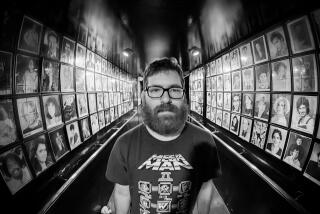Flame Into Being : THE LIFE AND WORK OF D. H. LAWRENCE by Anthony Burgess (Arbor House: $15; 276 pp.)
- Share via
“Flame Into Being” was written on the occasion of the 100th anniversary of D. H. Lawrence’s birth in 1885. Burgess traces Lawrence’s life and offers critical commentary on all the major and most of the minor writings. Though he initially planned to discuss only a few of Lawrence’s books, he found “that it was not possible to separate Lawrence’s work from his life.”
Burgess writes vigorously, concisely, and sometimes racily. He doesn’t pretend to have original things to say, but he provides a lively account of his subject. “Flame Into Being” isn’t a bad starting point for someone first coming to Lawrence.
Still, it’s a rather condescending portrait. Burgess emphasizes Lawrence’s driven, erratic, self-contradictory qualities. He makes him seem so out-of-control that it seems impossible that Lawrence could have written “Women in Love,” “one of the 10 great novels of the century.” Burgess’ version of Lawrence is almost totally lacking in intellect and doesn’t have any ideas of enduring value.
Burgess also makes mistakes. He seriously misinterprets Lawrence when he talks of love as a “fusion that dissolve(s) both persons involved,” and he’s dead wrong when he associates Lawrence with the notion of “ ‘good animals’ that human beings ought to be.” He doesn’t have the details of a 1907 short-story contest quite right, and he erroneously talks about the gamekeeper in “Lady Chatterley” “marrying a lady” since no marriage takes place between Mellors and Connie. Mary Cannon should be Mary Cannan, P. R. Stephenson is really P. R. Stephensen.
“Flame Into Being” is most intriguing whenever Burgess is writing as much about himself as about Lawrence. Lawrence received a 50-pound advance for his first novel, and Burgess is “proud to record” that he received the same advance from the same publisher for his novel--50 years later. “Sons and Lovers” remains a “remote clinical record” because Burgess’ own mother died in the influenza epidemic after World War I, making the Oedipus complex only a “matter of academic interest” to him. Elsewhere, he speculates about how Lawrence, transported to the 1980s, would have dealt with the problem of parking in Spoleto, and he interrupts a discussion of “Lady Chatterley” to tell us what the army recruit, “stripped for medical inspection,” replied when he was “rebuked for having an impertinent erection.” Like Holden Caulfield in his prep school English class, I like the digressions best.
Burgess’ own surprising bond of identification with Lawrence helps give the book its force. Like Lawrence, Burgess is a prolific British writer in exile living by the Mediterranean, married to a foreign aristocrat, and “trying to see the English the more clearly for not living with them.” He admires Lawrence’s “intransigence,” sympathizes with “his sufferings on behalf of free expression,” and identifies with him as a professional writer, someone immersed in the “daily struggle to make words behave.”
Lawrence’s fiery allegiance to “life” is at the heart of this book, and so is Lawrence’s conviction that “all literature is subversive.” Behind Burgess’ summing up of Lawrence is something like a personal summing up.
More to Read
Sign up for our Book Club newsletter
Get the latest news, events and more from the Los Angeles Times Book Club, and help us get L.A. reading and talking.
You may occasionally receive promotional content from the Los Angeles Times.










